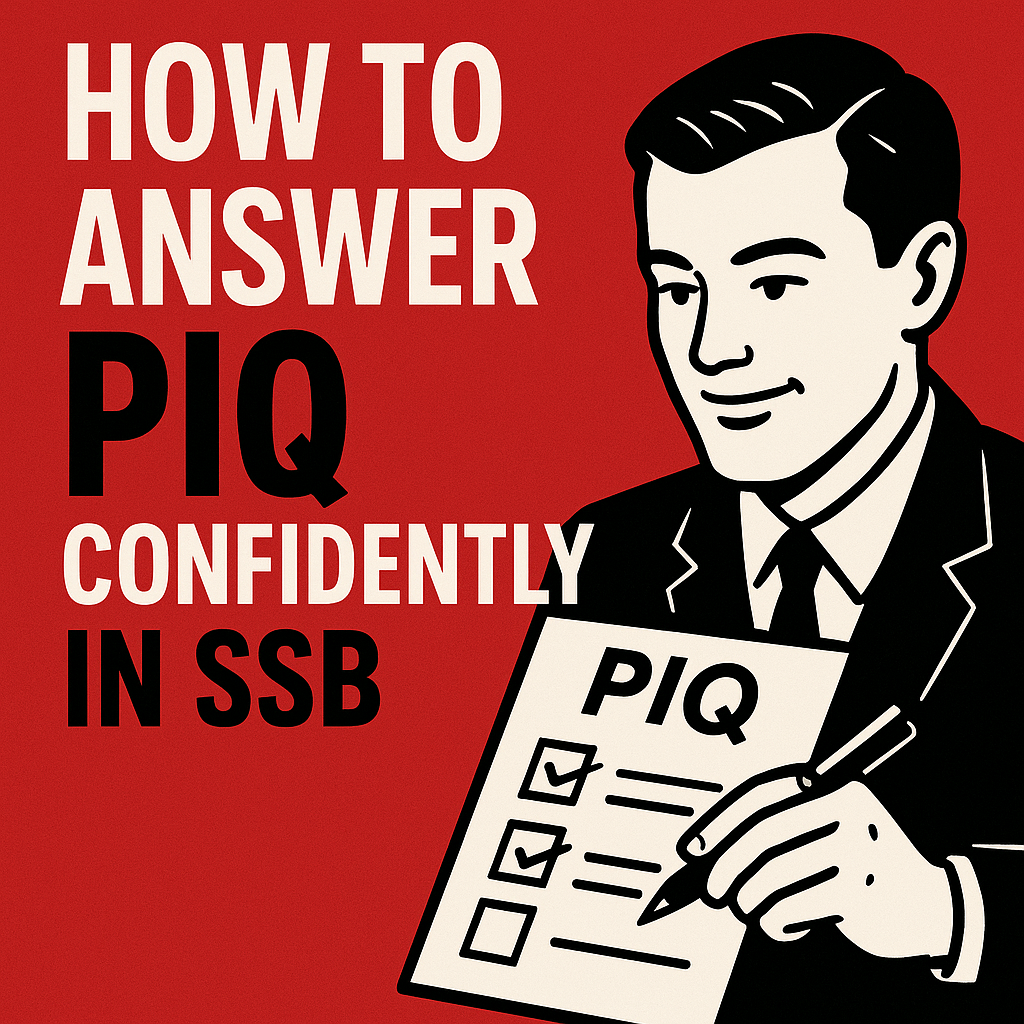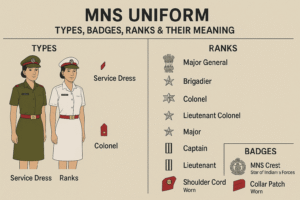The Personal Information Questionnaire (PIQ) is a critical document filled on Day 1 of the SSB Interview. It acts as the foundation of your SSB journey and plays a major role in all three assessments—Interview, Psychology, and GTO. Many candidates take the PIQ lightly, but in reality, it’s the first impression you make on the assessors.
This article will guide you on how to fill and answer PIQs confidently, what information to include, common pitfalls to avoid, and how to ensure consistency across all SSB tests.
WHAT IS THE PIQ FORM IN SSB?
The Personal Information Questionnaire (PIQ) is a form where candidates provide their personal, educational, family, and extracurricular details. The information is used by the Interviewing Officer (IO), Psychologist, and GTO to frame questions, verify your personality traits, and assess consistency.
SECTIONS OF THE PIQ FORM
The PIQ is generally divided into the following sections:
1. Personal Details
Name, date of birth, gender, address, state, religion, native place, etc.
2. Educational Qualifications
Academic history from 10th to graduation (marks, subjects, board/university).
Any distinctions or failures.
3. Family Details
Father’s, mother’s, and siblings’ education and occupation.
4. Hobbies and Interests
Games and sports you play.
Positions of responsibility held in school or college.
5. NCC/Sports Achievements
Certificates, participation at school/state/national level.
6. Other Personal Details
Writing habits, extracurricular activities, skills, languages known, etc.
WHY IS PIQ IMPORTANT IN SSB?
Basis of Interview Questions: Your entire Personal Interview revolves around your PIQ.
Psychology Test Reference: Your responses in TAT, WAT, SRT, and SDT should align with your PIQ.
Consistency Check: Assessors cross-verify your answers for truthfulness and clarity.
Judge OLQs: Helps assessors identify traits like initiative, leadership, and responsibility.
HOW TO FILL PIQ FORM CONFIDENTLY
1. Be 100% Honest
Never provide false or exaggerated information. Officers are trained to detect lies.
2. Write Clearly and Neatly
Use capital letters where required. Avoid overwriting or vague writing. Presentation matters.
3. Mention Specific Achievements
Instead of just writing “Cricket,” write: “Played Cricket at school level, inter-house champion, represented school team in district match.”
4. Show Involvement and Consistency
Even if you don’t have medals, mention your consistent participation or role. E.g., “Volunteered in school’s annual fest for 3 years.”
5. Highlight Positions of Responsibility
Showcase leadership. Examples:
Class Representative in college.
Hostel Prefect in school.
Team captain of debate club or sports team.
6. Keep it Realistic
Don’t mention too many hobbies unless you truly practice them. The interviewer will probe.
EXAMPLES OF GOOD RESPONSES IN PIQ
Hobbies and Interests
Poor: Reading, traveling, dancing, music, painting, yoga, gaming, coding.
Better: Reading autobiographies (read 10+), painting landscapes (hobby since Class 7), yoga (daily 30 min routine), music (trained in classical vocals for 2 years).
Games Played
Poor: Cricket, football, badminton.
Better: Cricket – played school tournaments, opening batsman; Football – inter-college forward player.
COMMON MISTAKES TO AVOID WHILE FILLING PIQ
Giving too little or too much information.
Exaggerating hobbies, achievements, or roles.
Mentioning irrelevant or unverified details.
Handwriting that is messy or unreadable.
Copying someone else’s format without self-reflection.
TIPS TO PREPARE FOR PIQ-BASED INTERVIEW QUESTIONS
1. Know Your PIQ Inside Out
Be ready to talk about anything you wrote. Questions will come from your PIQ—academics, family, hobbies, failures, strengths, etc.
2. Prepare Your “Story”
Each answer should give insight into your personality and actions. Prepare 2-3 real-life incidents for each point.
3. Maintain Consistency
If you mention you are an athlete, your stories and responses should reflect fitness, discipline, and team spirit.
4. Practice Speaking About Yourself
Have mock sessions where you describe yourself, your interests, and your background clearly and confidently.
HOW TO ALIGN PIQ WITH PSYCH TESTS AND INTERVIEW
If your PIQ says you’re social, your WAT and SDT should show interaction and teamwork.
If your PIQ says you play football, show sportsmanship, leadership, and decision-making in your SRT.
Your TAT stories should reflect responsibility and initiative similar to what your PIQ mentions.
FREQUENTLY ASKED QUESTIONS (FAQs)
Q1. Can I leave any field blank in the PIQ form?
Avoid leaving fields blank unless they’re truly not applicable. Write “Not Applicable” instead of skipping.
Q2. What if I have no major achievements or certificates?
Focus on participation, consistency, and learning. SSB values attitude and effort over medals.
Q3. Can I write creative hobbies like sketching or photography?
Yes, but ensure you can talk about it confidently. Be prepared to explain what you create, why you like it, and how you practice it.
Q4. Will the interviewer ask only from the PIQ?
Not only, but majority of questions come from PIQ. Be thorough with it.
Q5. Can I mention online certifications or competitions?
Yes, especially if they’re relevant (e.g., leadership, social work, sports, defense-related, tech-based etc.).
CONCLUSION
Filling and answering the PIQ in SSB is not just about writing facts—it’s about presenting your personality with confidence and honesty. This single form influences how the interviewing officer, psychologist, and GTO perceive you. Fill it truthfully, support it with real-life experiences, and stay consistent across all tests. With proper self-awareness and preparation, your PIQ can become your strongest asset in the SSB selection process.






